Issue #14 - From 2024 to 2025: Shaping Your Next Chapter
Hey everyone!
Welcome to this special year-end edition of our newsletter: "From 2024 to 2025: Shaping Your Next Chapter"!
As we wrap up 2024, it’s the perfect time to pause, reflect, and plan for the year ahead. This issue brings valuable insights on the power of year-end milestones, trends to watch for 2025, and exciting achievements, including updates to the AIPM certification program. A special highlight goes to the results of our recent Black Friday campaign, where your incredible participation made a meaningful impact, fueling our scholarship program and supporting students around the globe.
Let’s use this transition to align our goals and actions with purpose. Whether personal or professional, each step we take shapes the next chapter of our story. Wishing you all a joyful holiday season and an inspiring start to 2025!
Happy reading!
Ricardo

In This Issue
- Reflecting and Planning: The Power of Year-End Milestones
- Generative AI tools in 2024
- The Economist’s 10 Trends to Watch
- The World Ahead 2025: What’s Next?
- 15 tech trends to watch closely in 2025
- AIPM Certification Updates
- AI-Driven Project Management Masterclass - Black Friday Special!
- Celebrating a Milestone: 25 Years with PMI Minas Gerais
Reflecting and Planning: The Power of Year-End Milestones
December and January hold a special place in my heart. Not only because of the end-of-year-end festivities but because they mark a natural pause transition in our lives. And we all need to use this pause transition to review and rethink our professional and personal paths moving forward.
While dates are human constructs, for me, this transition is meaningful. Each December, I reflect on the past year and think deeply about the future I want for myself.
It’s not about reviewing global events but assessing “my” year.
What went well? What didn’t? What would I repeat, and what would I change? This personal milestone helps me evaluate my progress and set my intentions for the upcoming year.
Some people start lots of “personal projects” and get super busy at the beginning of each year. I ask myself: What’s their plan? Where are they trying to go? What do they want to achieve?
If we cannot answer these fundamental questions, it becomes impossible to assess whether the projects we are undertaking are relevant. This is relevant because every decision we make should align with our long-term strategy.
While you assess your projects, let me ask: Why are you pursuing the projects you're working on? For example, if your goal is to buy and move to a farmland, what purpose does this serve? Does it align with where you want to be in five years?
Maybe you dream of living abroad. If so, investing in farmland might not make sense at all, as it anchors you to one place.
On the other hand, if your vision is to have a quieter, rooted life, this could be a perfectly strategic and aligned decision. this could be a perfectly strategically aligned decision.
Years ago, I realized that while I helped organizations manage large and complex projects, programs, and portfolios, I wasn’t applying the same logic to my life. Why not treat my personal goals — whether personal or professional — as a project portfolio?
The shoemaker's son always goes barefoot.
So, in 2006, I started a structured process of annual reflection and planning. It’s been 18 years now, and this practice has become essential to my professional and personal growth.
Every December, I review my "portfolio" of initiatives for the year that is ending, and I prepare myself for the upcoming year.
This portfolio ranges from personal goals, like traveling or improving fitness, to professional ambitions, like writing articles, building client relationships, developing new products, or attending conferences. All of this goes together into my portfolio because, for me, there is no such thing as work-life balance.
In the end, there is only life, and if you believe that when you are working, you are not living, your life becomes miserable.
I ask myself: Did I accomplish what I set out to do? Which efforts added the most strategic value to my goals? What could I have done differently?
It reminds me that success isn’t random — it’s deliberate. Achievements happen because we prioritize and commit to them.
There is always time for the things that matter to you.
Here’s how I suggest you approach this evaluation process:
- Find a quiet hour. Spare one hour to do that.
- List your accomplishments. What projects did you successfully complete this year in your personal and professional life?
- Evaluate each item. Imagine yourself as someone outside your own life and answer the following questions: Did the projects I completed help me with my long-term goals? Did these accomplishments it happen by chance or deliberate effort? Was the effort worth it, or should I have spent time on something different? If yes, on what?
- Revisit January 1st. If you could start the year again, what would you do differently?
- Set intentions for the coming year 2025. Which projects deserve more focus? What new goals excite you?
This exercise isn’t about regret… It’s about learning. It’s about recognizing patterns and shaping your future intentionally.
Each of us has a different life story, and I want to share a personal anecdote with you. In May 2020, at the height of the pandemic, with so much uncertainty, my oldest daughter came to me crying and hopeless about the future. She said that all internships for the summer were canceled, and this meant that finding a job would be impossible without having had an internship.
While nurturing her, I started telling her that our future relies more on us than on external events, and together, we started reflecting deeply on life, her career, and the values and goals that truly mattered to us.
Of course, I was thrilled that I could provide her with some direction to her. However, during our reflections, we realized how fortunate we were to have a close relationship and that she could learn from my perceptions, my hits, and my misses.
But what about other daughters and sons who do not have parents or anyone to support them? What about those living in completely dysfunctional homes? What would they do? How do they get out of this trap?
This is how my favorite project of all time was born—the What Matters Series. I decided to record a series of 4 episodes talking about what I would say to myself 25 years ago.
This project had no direct relationship to what I do professionally. I am not a coach; I do not work helping people to solve their own challenges or implement their projects.
I work with companies on very tangible large projects and efforts, and I had no intentions of changing my business profile.
Not at all.
Would this effort make sense in the context of my broader strategy goals? Spending a relevant amount of money out of my pocket to produce it, dedicating 3 weeks of my time and time away from clients to prepare and record it this series did not seem to make sense when looking if you look through the lenses of what is the “obvious.”
Four years later, as I revisit my personal strategy map (yes, I have one), which I’ve been updating annually since 2006, I notice key priorities under my “Personal Perspective.” This perspective replaces the “Financial Perspective” found in corporate strategy maps. The highlighted topics include: “Sustain relationships and emotional connections” and “Generate a positive impact in society.”
These priorities are supported by a specific objective in the “Process – Relationships” area: “Develop inclusive and impactful actions in the area and for professionals.”
Through this series, I actively contributed to 3 of the 33 objectives outlined on my strategy map. Below, you can see my actual strategy map in action. Today, 4 years later, if I go back to my personal strategy map (yes, I have a personal strategy map, updated every year since 2006), I see my “Personal perspective” (that replaces the financial perspective of a company) the topics: “Sustain relationship and emotional connections” and “Generate a Positive Impact in the Society” followed by a specific objective in my Process – Relationships Area “Develop inclusive and impactful actions in the area and for professionals.”
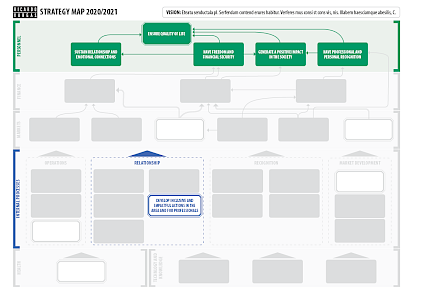
2020 Personal Map highlighting the related topics. Other topics are intentionally blurred because this is my plan, and yours will be obviously different
I did it as a gift to myself, my family, and especially my daughters, who were facing one of the most challenging and uncertain moments of their young lives, and also as an action to support my fellow colleagues and generate a positive impact in society.
For those who did not have the chance to see it at the time, the series explores the principles that shape our choices, careers, and happiness. It’s available on YouTube, and I invite you to watch it. There are four 10-minute episodesIt is four episodes of about 10 minutes. I did create it with the best possible intention.
Revisiting this project reminds me how important it is to align your actions with your values, especially during uncertain times.
And when I look back at 2024, I notice something: my most impactful projects weren’t successful by luck—they were the result of deliberate effort and intention. And when I look back at 2024, I notice something: the most impactful projects weren’t accidental. They were deliberate.
Whether it was investing in AI knowledge, posting regularly on LinkedIn, or starting new initiatives, these actions were part of a broader strategy.
For example, when AI became a dominant topic in late 2022, I made a deliberate choice to make it a priority for 2023. I developed six personal projects on AI in 2023. In 2024, I am working on 11 (AIPM credential, masterclass, and articles are all examples of that). I do not know the exact number for next year because I am working on that as I write this newsletter. . You can see the actual strategy map and my portfolio below, with the AI projects in blue.
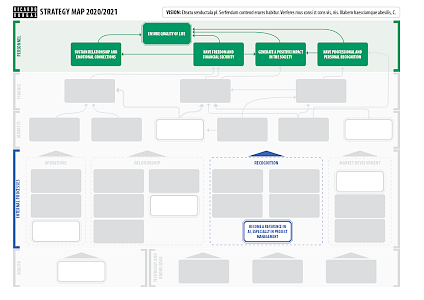
2024 Personal Map with the new objective created: “Become a reference in AI, especially in project management." Other topics are intentionally blurred.
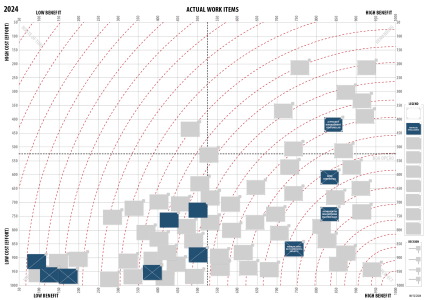
2024 Cost x Benefit Analysis highlighting the 11 projects on AI out of 54 total projects in my portfolio. AI Projects that have already been released are visible, while the other topics are intentionally blurred.
Of course, to do that, I had an assumption underlining my strategy: AI transformation would reshape industries, including my own. If I am not prepared, I could miss this transformation and become irrelevant. If I am ready and in a good position, this can drive the relevance of my work to a different level.
That’s why alignment is absolutely crucial.
Let’s be totally honest here… How often do we finish the year and realize we’ve spent time on projects or tasks that didn’t align with our goals? Why does this happen? Were you chasing FOMO (Fear of Missing Out)? Did you let others’ expectations steer your path?
This type of self-assessment is critical. Understanding these missteps helps us refocus and move forward with clarity and purpose.
This deliberate focus gave me direction and fulfillment. And it’s a reminder that:
Without clear intentions, we drift.
December and January aren’t just about celebrations. They’re about accountability. If you don’t evaluate your own set of projects, who will?
This process is simple but powerful: Reflect > Evaluate > Adjust > Plan.
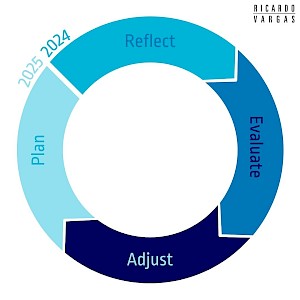
Cycle of Planning
Whether your goals are personal or professional, this mindset turns dreams into actionable steps.
Remember Alice’s conversation with the Cheshire Cat in Alice in Wonderland:

Adapted from Cheshire Cat from Disney's Alice in Wonderland (1951). © Disney.
“Where do you want to go?” the Cat asks.
“I don’t know,” Alice replies.
“Then it doesn’t matter which way you go,” the Cat concludes.
If you don’t know where you’re heading, any path will do.
But if you have a clear destination, your actions become purposeful.
Remember, your life is your portfolio. Only you can decide which projects deserve your time and energy.
Use December and January wisely — they’re the perfect months to recalibrate your direction for the year ahead.
As 2024 ends, I encourage you to pause, reflect, and decide: What do you want from 2025?
The choice is yours! Absolutely yours!
Happy Holidays!!
What Has Been on My Radar Recently?
12 Days of OpenAI: o1 and ChatGPT Pro Released
Last week, OpenAI CEO Sam Altman announced the release of the Open AI O1 and the new ChatGPt ChatGPT Pro subscriptions ($200/monthly).
The o1 pro mode uses more complex computing to think harder and provide even better answers to the most challenging problems. This release was part of “12 Days of OpenAI”, or what they called the “shipmas” period of new features, products, and demos for 12 days that started on December 5th.
The announcements may include OpenAI’s long-awaited text-to-video AI tool, Sora, among other features. You can track the news day to day here.
Generative AI tools in 2024
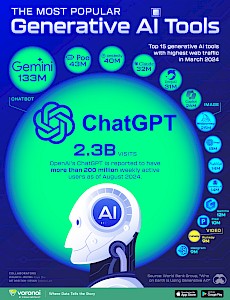
Ranked: The Most Popular Generative AI Tools in 2024 © Visual Capitalist
I recently came across this infographic by Visual Capitalist, which highlights the most popular AI tools in 2024. It’s fascinating to see how tools like ChatGPT, Claude, and MidJourney are taking the lead in terms of usage and impact.
With so many new players entering the space, I'm curious to see how the landscape will change next year.
Will these tools continue to dominate, or will something new come to the forefront?
Let’s see how this AI revolution unfolds!
The Economist’s 10 Trends to Watch
As we transition into 2025, I’ve been keeping a close eye on key trends that are shaping the future — especially in AI, global politics, world conflicts, and economics.
One of my “must read” topics at the end of the year is the “World Ahead” report from The Economist, which always offers valuable insights into emerging global patterns and trends.
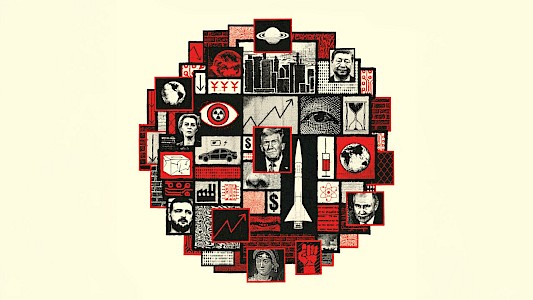
The World Ahead is an annual special year-end issue of The Economist.
They highlighted ten trends that are likely to influence the world in the coming years, from shifts in geopolitics to the rise of digital economies.
Do not miss Tom Standage’s ten trends to watch in 2025. It is a fantastic set of insights that will help us identify threats and opportunities for projects, organizations, and ourselves. Among them, AI advancements, climate change policies, and evolving political alliances are key areas to watch.
This comprehensive outlook examines what the world could look like by 2025. It paints a fascinating picture of the future, analyzing key trends that will likely shape global economies and politics in the coming years.
These insights help us anticipate the future so we can adapt our strategies and actions accordingly.
Both of the reports are invaluable for anyone who wants to stay ahead of the curve.
By understanding both the macro trends of the world and emerging technologies like AI, we can make more informed decisions and steer our personal and professional lives toward success.
15 tech trends to watch closely in 2025
The other day, I also came across this report from CB Insights, called "15 Tech Trends to Watch Closely in 2025," and found it incredibly insightful.
Key takeaways include AI agents gaining spending power through new infrastructure, next-gen data centers evolving to meet AI’s growing energy demands, and RNA therapeutics driving innovation in treatments for diseases like Alzheimer’s.
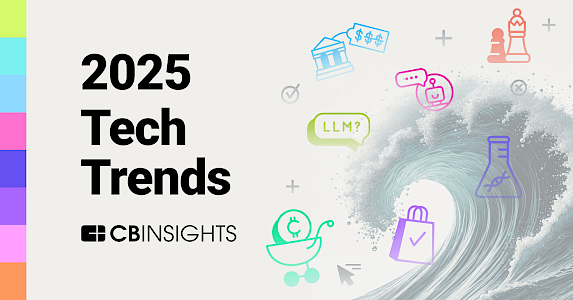
2025 Tech Trends by CBSInsights
AI is also transforming corporate strategy, with companies like NVIDIA acquiring startups and revolutionizing disease management with early detection and precise symptom evaluation.
In retail, generative AI is enabling hyper-personalized shopping experiences, boosting sales rates significantly.
The report offers a clear roadmap for navigating pivotal tech shifts in 2025, and you can read it here.
Quick Announcements
Celebrating 162 Certified AIPM Professionals
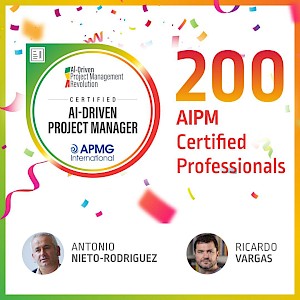
Antonio Nieto-Rodriguez and I are excited to share that the AI certification reached 200 certifications awarded on December 5th!
The AIPM Credential, developed by Antonio and me in collaboration with APMG International — one of the world’s leading accreditation and exam institutes— aims to transform how project managers integrate AI into their projects.
This certification not only enhances your skill set but also prepares you for the future of project management.
As more people take the exam, APMG performs several psychometric analyses of the exams. In the last one, they removed some questions, included others, and reduced the passing threshold from 70% to 60%. The new passing score is 24 out of 40 questions.
At the same time, more questions are coming entering to the pool, and Antonio and I will record several videos for the AIPM prep material this week. All those already engaged or certified will benefit from the new content in our online platform.
We know that some of you may have received a failed score, which would be a passing score, and you had to pay for resisting the exam. We are working with APMG on that, but regardless of what we agree with, Antonio and I decided to reimburse every candidate who had a failed attempt and bought a second voucher for the exam.
The last thing we want is to take any benefit on top of failing scores. We are reaching out to each of these students individually to organize the reimbursements.
One final remark: remember that the AIPM exam content will be updated frequently to reflect the new trends.
We sincerely appreciate your understanding and commitment to advancing your expertise in artificial intelligence and project management. Thank you for being part of this growing community!
You can learn more about the certification here.
Last Round of 2024 for our Scholarship and Financial Aid Program
If you've been thinking about applying for our scholarship program, now is the time. Applications are open for the final opportunity this year—don’t miss your chance!
Students from war-torn areas, low-income countries and regions, unemployed, disabled, and other underrepresented minority groups underrepresented are welcome to apply.
In a world that can sometimes feel divided, there's nothing more inspiring than coming together to lift each other up.
To our incredible students: Thank thank you. Your enrollment in our courses doesn’t just support your personal growth—it fuels a greater mission.
Together, we’re helping others pursue their dreams through education.
A special shout-out to everyone who joined during our Black Friday campaign, where 100% of the funds are allocated to this scholarship program.
Your support makes all of this possible, and we couldn’t be more grateful.
As of last month, we released more than US$25k in scholarships for 133 registrations from 42 countries.
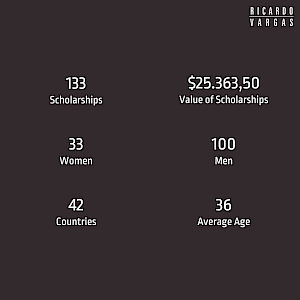
Ricardo Vargas Online School Scholarship and Financial Aid Results (Nov 2024)
Let’s keep making a difference together. Candidates for the scholarship can register here.
Celebrating a Milestone: 25 Years with PMI Minas Gerais
In November, I had the honor of attending the 25th anniversary of the PMI Minas Gerais Chapter, a community that holds a special place in my heart, as I was one of its founding members.
Reflecting on the incredible journey that has brought us here, I found myself sitting in my mother’s house in Belo Horizonte, surrounded by memories from the early days.
This anniversary is more than just a celebration… it's a chance to pause and appreciate the shared vision and hard work that created something truly lasting.
No significant achievement is the result of one individual alone — it's the collective effort of many hands, ideas, and dreams coming together.
I also recorded an episode of my 5 Minutes Podcast dedicated to this. You can watch it here:
In it, I express my gratitude to the global Project Management Institute community, from which I've gained so much support, learning, and inspiration. As I look ahead, I believe that the best is yet to come for this community and the profession at large.
A special note: towards the end of the video, I became more emotional than usual, but I decided to keep it as it is — a raw and genuine moment for future project managers to witness.
Let’s continue to move forward with patience, gratitude, and the belief that the best is yet to come.
Your Voice Matters!
You can also read the previous issues here.
If you have any suggestions, comments, or anything else to help me improve the e-newsletter, please message [email protected]. I would love to hear from you.
Please share this newsletter with your friends, colleagues, and other people you may find will benefit from it.
They can also subscribe to receive it here.
Thanks for your support, and I hope it was helpful to you.
Cheers,
Ricardo



